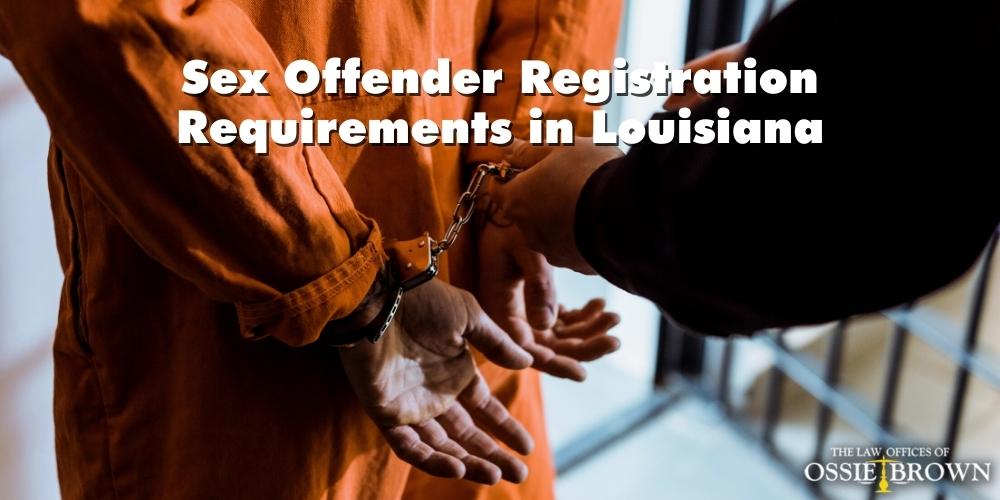Getting convicted of nonconsensual sexual conduct or sexual conduct with a minor in the United States can quite literally follow you for the rest of your life. This is all thanks to the Sex Offender Registration and Notification Act (SORNA), passed in 1994. Tracking sex offenders once they’re released from jail is legally required under this law. Convicted sex offenders must remain on a database for decades, or for their entire lives, depending on the severity of their sex offense and how many times they have committed the sex offense. Sex offender registration requirements can vary from state to state. Below, our legal team breaks down the specific sex offender registration requirements – as well as the penalties associated with failing to register as a sex offender – in the state of Louisiana.
If you have been charged or convicted of a sex crime in Louisiana, you need aggressive legal representation on your side. An experienced criminal defense lawyer in Baton Rouge, LA, can potentially help you achieve a shorter sentence or a lesser charge. Call 225-343-1111 to schedule a free consultation with a Baton Rouge sex crimes lawyer at the Law Offices of Ossie Brown today.
What is a Sex Offender?
A sex offender is anyone who has committed sexual violence towards a minor or an adult. Registered sex offenders are generally separated into three different categories depending on the severity of the sex offense committed and how many times they have committed the sex offense.
Here are the Louisiana sex offender tiers:
- Level One means that the sex offender is considered low risk for committing another sex crime.
- Level Two means that the sex offender is considered a moderate risk for committing another sex crime.
- Level Three means that the sex offender is considered a high risk for committing another sex crime. This category of sex offenders likely has multiple convictions on their records. They are also considered a public safety threat, and they may have a tendency to be violent.
What is the Sex Offender Registration and Notification Act?
The Sex Offender Registration and Notification Act (SORNA), passed in 1994, is a federal law that requires all 50 states to have a nationwide network in place to track sex offenders once they’re released from jail. Those who fail to register as a sex offender in their state or fail to regularly update their registration are committing a federal crime under SORNA.
Sex Offender Registration and Notification Act (SORNA) History
In 2006, U.S. President George W. Bush passed SORNA into law under Title I of the Adam Walsh Child Protection and Safety Act. The federal government passed the Adam Walsh Child Protection and Safety Act on the 25th anniversary of the kidnapping of Adam Walsh. The 6-year-old boy was kidnapped from a shopping mall in Florida and found dead 16 days later. His killer was never identified and convicted, although in 2008, Florida police theorized that a serial killer who had died in jail in 1996 had likely committed the crime.
Sex Offender Registration and Notification Act (SORNA) Requirements
SORNA’s requirements vary depending on which of the aforementioned three categories the sex offender falls into.
- Level One: Sex offenders convicted of level one sex offenses must be registered for at least 10 years but only if they don’t have more than one conviction on their records that’s punishable by a minimum of 1 year in jail. They must also complete their parole sentence or their sex offender treatment program. If they fail to meet these requirements, then they must be registered for a minimum of 15 years.
- Level Two: A level two sex offense is one that is punishable by at least 1 year in prison and involves sexual conduct with a minor of at least 13 years of age, sex trafficking, coercion, enticement, producing or distributing child pornography, etc. A person convicted of a level two sex offense must be registered for a minimum of 25 years.
- Level Three: Sex offenders fall into this category if their crime involves aggravated sexual abuse, sexual contact with a minor under 13 years old, or kidnapping. Sex offenders can also fall into this category if they have previously committed one or more level-two crimes. Level three sex offenders must be registered for life after their release from jail. They must also provide advance notice to a local law enforcement agency every single time they move to a different city or state.
Sex Crimes That Warrant Sex Offender Registration in Louisiana
Louisiana state law (RS 15:542) requires sex offenders to register pursuant to SORNA if they’re convicted of the following types of sexual offenses:
- First, second, or third-degree rape
- Sexual battery
- Possessing, producing, distributing, or promoting child pornography (see more on Louisiana porn laws)
- Sex trafficking
- Soliciting a prostitute
- Indecent exposure
- Knowingly possessing an STD, failing to inform a sexual partner of this STD, and giving the STD to the partner without their knowledge
- Indecent behavior with juveniles
- Aggravated kidnapping of a child under 13 years old
- Felony carnal knowledge of a juvenile
Our criminal defense attorneys can provide answers to common questions, such as what STDs do you legally have to disclose in Louisiana or can someone press charges without proof in Louisiana during your free consultation.

Sex Offender Registration Requirements in Louisiana
Sex offender registration laws in Louisiana require offenders to provide the following information once they’re released from jail:
- Name and aliases
- Date of birth
- A brief description of the sex offender’s physical characteristics (hair color, eye color, skin color, weight, height, etc.)
- Address of where the offender resides (and updated addresses if the offender ever moves out of jurisdiction)
- Address of the offender’s place of employment
- All online identifiers such as online screen name(s), email addresses, etc.
- The date and place of conviction
- The specific sex crime committed and any other criminal history
- DNA evidence including fingerprints, palmprints, saliva, etc.
- Current photograph
- Social security number
- License plate number
- A copy of the offender’s driver’s license
- A copy of the offender’s passport, immigration papers, and any other international travel information
In the state of Louisiana, sex offenders must provide this information within three business days of their release from jail. Federal law requires all law enforcement agencies to notify local schools, social service agencies, volunteer organizations, and public housing authorities of all registered sex offenders in the area.
Sex Offender Restrictions in Louisiana
Registered sex offenders cannot acquire certain jobs such as school jobs, daycare jobs, and even public transportation jobs. Registered sex offenders must also stay a specific distance away from schools, daycares, playgrounds, and any other locations that children go frequently.
How Long is Sex Offender Registration Required in Louisiana?
A registered sex offender must stay registered for 10 years, 15 years, 25 years, or for life, depending on the severity of the crime and their criminal history. But even when someone’s sex offender registration ends, their name will remain on the national SORNA database forever. It’s also very likely that community members will always view the sex offender as just that – a sexual predator – even if they no longer have to remain on the active registry.
Penalties for Failing to Register as a Sex Offender in Louisiana
Failure to register as a sex offender within 3 business days, failure to register at all, and/or failure to regularly update registration in Louisiana results in the following penalties (according to RS 15:542.1.4):
- First Offense: 2 to 10 years in jail at hard labor and a maximum fine of $1,000.
- Second and Subsequent Offenses: 5 to 20 years in jail at hard labor and a maximum fine of $3,000.

Call a Baton Rouge Sex Crimes Lawyer at The Law Offices of Ossie Brown Today
If you are charged or convicted of sexual crimes in Louisiana, it’s crucial to have an experienced lawyer on your side. Additionally, if you’re facing charges related to sex offender registration in Louisiana, you also need experienced legal counsel. Baton Rouge sex crime lawyers at the Law Offices of Ossie Brown have been protecting and defending clients since 1984. We can help you potentially achieve a lesser charge or a lesser sentence. We can also ensure you fulfill all of the necessary sex offender registration requirements in Louisiana upon release from jail. Call 225-343-1111 to schedule a free consultation with our top-notch legal team today.

